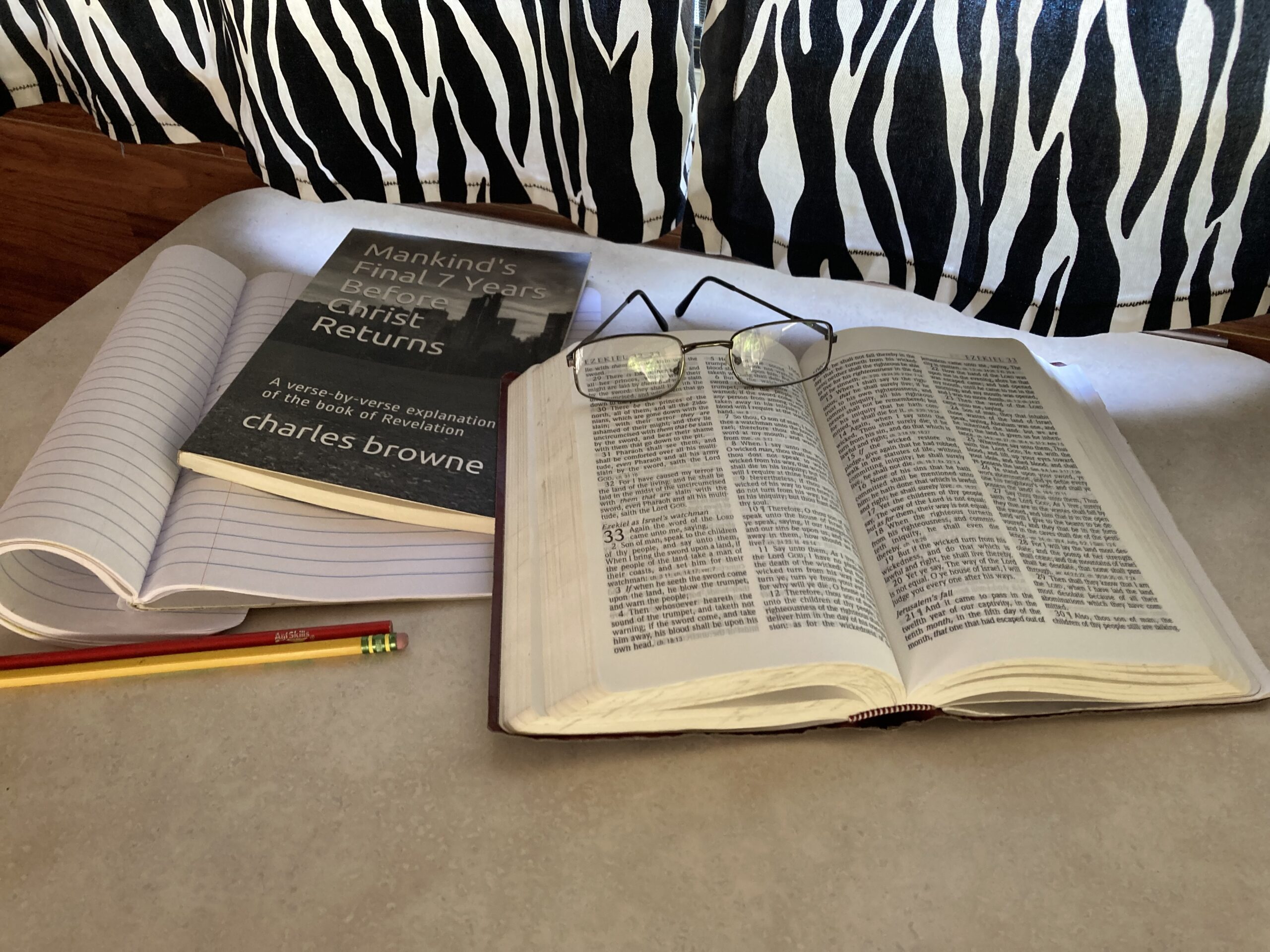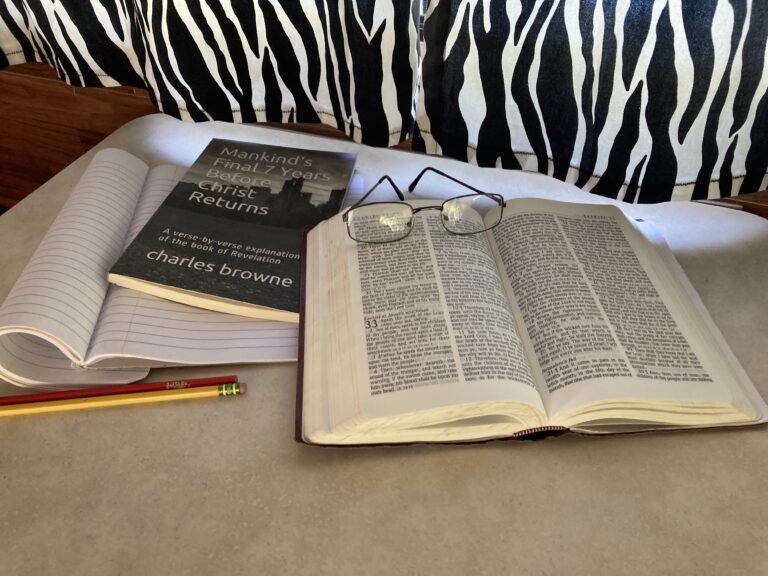THE BOOK OF DANIEL, Chapter 12
[This is an excerpt from my book, Mankind’s Final 7 Years Before Christ Returns: A verse-by-verse explanation of the book of Revelation]
12 And at that time shall Michael stand up, the great prince which standeth for the children of thy people: and there shall be a time of trouble, such as never was since there was a nation even to that same time: and at that time thy people shall be delivered, every one that shall be found written in the book.
The phrase “at that time” must refer to the events of the last verses of chapter 11, at least verses 36-45 which clearly refer to a certain king. Coupled with the fact that Jesus specifically referred to this verse as a future event (Matthew 24:21; Mark 13:9), and this and the next verse links it to the end-time resurrection and judgment of the dead, we can see clearly that these verses are speaking of end-times events. Any attempts to apply the last verses of chapter 11 to a historical figure, now crumble into dust.
There is also much debate as to whether the phrase “thy people” refers to Jews, or to Christians, or both. And there is much debate as to whether the phrase “shall be delivered” refers to the physical deliverance of Israel to safety (Revelation 12; Jeremiah 30:7), or to spiritual salvation of Jews (Romans 11:25-28) or to the eternal salvation of all believers (Acts 26:23). The phrase “written in the book” refers to the final judgment (Revelation 20:11-15; 21:27).
2 And many of them that sleep in the dust of the earth shall awake, some to everlasting life, and some to shame and everlasting contempt.
This appears to be a direct reference to the Judgment Day (Revelation 20:12). Jesus said, in John 5:28-29, “Marvel not at this: for the hour is coming, in the which all that are in the graves shall hear his voice, And shall come forth; they that have done good, unto the resurrection of life; and they that have done evil, unto the resurrection of damnation.” Commentators who cling to the view that this is all fulfilled prophecy referring to a historical figure, demand that this cannot refer to the Judgment Day because the word “many” is used rather than the word “all”. But, they completely ignore the word “everlasting”.
3 And they that be wise shall shine as the brightness of the firmament; and they that turn many to righteousness as the stars for ever and ever.
Some view this verse as referring to those who lead others in resistance against the oppressor, whether historical or prophetic. Others view it as referring to the resurrection and rewarding of the saints (Matthew 13:43; 2 Timothy 4:8; 1 Corinthians 15:41-42).
4 But thou, O Daniel, shut up the words, and seal the book, even to the time of the end: many shall run to and fro, and knowledge shall be increased.
Commentators debate as to whether the command to “shut up the words, and seal the book” means to put this prophecy in writing, but keep silent about it, or, that it means to guard and protect the words of the prophecy. In chapter 8:26-27, Daniel is told “shut thou up the vision; for it shall be for many days”, after which he put it in writing and, apparently, shared it with others.
Concerning the phrase “many shall run to and fro, and knowledge shall be increased”, the traditional view was that this referred to people seeking to understand this prophecy. The modern view is that it refers to a general increase in knowledge (but not wisdom) among mankind in the last days. Both views point to an end-times fulfillment.
5 Then I Daniel looked, and, behold, there stood other two, the one on this side of the bank of the river, and the other on that side of the bank of the river.
6 And one said to the man clothed in linen, which was upon the waters of the river, How long shall it be to the end of these wonders?
The spiritual being, which had been giving this prophecy, now stood over the river (similar to Daniel 8:16), and Daniel now sees that he is accompanied by two other spiritual beings. Those who claim that the messenger is Christ, use these verses as “proof”, since the two seem to be waiting upon him.
It is not clear whether the angel asked the question for the benefit of Daniel, and us, or for his own benefit (1 Peter 1:12; ).
7 And I heard the man clothed in linen, which was upon the waters of the river, when he held up his right hand and his left hand unto heaven, and sware by him that liveth for ever that it shall be for a time, times, and an half; and when he shall have accomplished to scatter the power of the holy people, all these things shall be finished.
The phrase “a time, times, and an half” (also used in Daniel 7:25; Revelation 12:14) is generally believed to mean 3 ½ years, or 42 months (Revelation 13:5, 11:2), or 1,260 days (Revelation 12:6). The period of time is referred to as 3 ½ days in Revelation 11:3-11. Daniel 12:11-12 adds another 30 days (1,290 days) and then an additional 45 days (1,335 days), though it is unclear what occurs during that time.
Some commentators believe this period is 1,260 years, though they are unclear on when the time begins or ends. Some even lean toward less clarity, and believe it means a time- a long period, times- a longer period, and a half – the end or closing period, which literally means that many years must elapse before God fulfills this prophesy.
The phrase “shall have accomplished to scatter the power of the holy people” appears to refer to the second half of Daniel’s 70th week (Daniel 9:27), after the “abomination of desolation” is set up in the temple (Matthew 24:15-22; Mark 13:14). There is much debate as to whether “the holy people” refers to Jews or Christians, but Revelation 11 makes it clear that it refers to both Christians and Jews.
8 And I heard, but I understood not: then said I, O my Lord, what shall be the end of these things?
The angel asked the question in verse 6, but Daniel didn’t understand the answer given in verse 7, so he asks it again.
9 And he said, Go thy way, Daniel: for the words are closed up and sealed till the time of the end.
In verse 4, Daniel is commanded to “shut up the words, and seal the book, even to the time of the end”. Now, he is told “the words are closed up and sealed till the time of the end”, even though Daniel had done nothing yet. It appears that, until the very end-time, we can never have more than a vague understanding of this prophecy.
10 Many shall be purified, and made white, and tried; but the wicked shall do wickedly: and none of the wicked shall understand; but the wise shall understand.
The angel repeats his statement, from chapter 11:35, with the phrase “Many shall be purified, and made white, and tried”. This specifically refers to the end-times Great Tribulation period, in which the testing purifies the church (Revelation 7:14; 1 Peter 1:6-7; Zechariah 13:8-9; Psalm 51:7).
The phrase “but the wicked shall do wickedly” refers to the fact that, in the end-times, the wicked will not turn from their wickedness, despite the wrath of God being poured out upon them (Revelation 9:20-21, 16:8-11; 2 Thessalonians 2:10-12).
The phrase “none of the wicked shall understand; but the wise shall understand” refers to the fact that believers will understand end-times events, because God always makes His plans known to His people (Amos 3:7; 1 Thessalonians 5:2-6; Luke 8:10; Matthew 13:11).
11 And from the time that the daily sacrifice shall be taken away, and the abomination that maketh desolate set up, there shall be a thousand two hundred and ninety days.
This verse clearly refers to the time of the prophecy of Daniel 9:27 “And he shall confirm the covenant with many for one week: and in the midst of the week he shall cause the sacrifice and the oblation to cease, and for the overspreading of abominations he shall make it desolate, even until the consummation, and that determined shall be poured upon the desolate.”
As mentioned in verse 7, this verse adds 30 days to the 1,260 days concerning this prophecy. There are many views as to when, and why, these extra 30 days occur. We can only know for sure that the events of verse 7 do not cover the entire time of verse 11. Commentators who claim this verse is historical, rather than prophetical, give no half-way satisfactory answer for the extra 30 days.
12 Blessed is he that waiteth, and cometh to the thousand three hundred and five and thirty days.
Now, an extra 45 days is added to the 1,260 days. Again, commentators offer many vague, mostly historical, views for this extra time.
The 1,260 days, we are clearly told, is the time that the Antichrist is allowed to reign and persecute the saints (Daniel 7:25; Revelation 13:5, 11:2, 12:1-17). I believe that the extra 30 days occurs between the Antichrist proclaiming himself god (2 Thessalonians 2:3-4), and the 1,260 days that he is actually given authority. This would give believers of Jesus a short time in which they might heed His warning to flee Israel (Matthew 24:15-21). I believe the extra 45 days occurs at the end of the 1,260 days (1,290 days), and is the time in which the bowls of God’s wrath is poured out on unbelievers (Revelation 15 &16), when Jesus overthrows the wicked kingdoms of the world (Revelation 19:11-21), and sets up His earthly kingdom (Revelation 20:4-6; 1 Corinthians 15:24-25).
13 But go thou thy way till the end be: for thou shalt rest, and stand in thy lot at the end of the days.
I believe that this is the most important verse in the book of Daniel. It is a message to all people. Live your life however you choose, until you sleep in the grave, and then, be prepared to stand in your lot at the resurrection (…they that have done good, unto the resurrection of life; and they that have done evil, unto the resurrection of damnation.- John 5:28-29)



One Comment